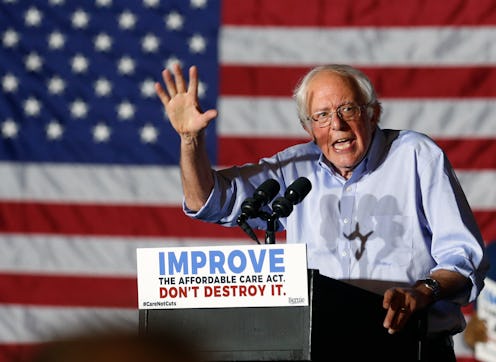News
How Bernie Sanders' New Bill Could Transform Health Care In America

He may have lost the Democratic primary in 2016, but the self-styled Democratic Socialist has emerged at the forefront of a progressive shift within the party. On Wednesday, Bernie Sanders will introduce his Medicare For All Act in the Senate, and in a New York Times op-ed published the same day, Sanders urged his fellow Congress members that "now is the time" for it.
In arguing for a single-payer system — or, as Sanders dubs it, "Medicare for all" — the Vermont senator highlights the inefficiency that is the result of a profit-driven insurance industry.
The reason that our health care system is so outrageously expensive is that it is not designed to provide quality care to all in a cost-effective way, but to provide huge profits to the medical-industrial complex.
The culprits here include insurance companies, pharmaceutical manufacturers, Wall Street, and lobbyists.
There was a time not so long ago when just whispering "single-payer" would have killed even the best and brightest of politicians. President Obama did not even offer such a system during the debate and subsequent passage of the Affordable Care Act. Privately-run health care, despite its various problems, was seen by most Americans as a superior option to socialized medicine. Where the cracks in that philosophy started to show will likely be a topic of debate for years to come; for now, it appears that the American approach to a government-controlled and government-run health care system is moving.
With the Republicans unable to come up with the votes to repeal Obamacare, there is now an imperative on both parties to fix the health care system. Sanders is arguably the most progressive member of the Senate, but his bill has gained the support of at least 15 Democratic senators. That's an impressive count, and more Dems may very well throw their support behind the bill.
But as Dave Wiegel points out at The Washington Post, there is "no chance of passage" for single-payer while the Republicans control Congress. Whatever support Sanders gains for his single-payer advocacy in the general public, that will need to translate into votes to change the party makeup of both chambers before real legislation can move forward.
Sanders will also need to convince many skeptical members of the Democratic party — those include Senate Minority Leader Chuck Schumer and House Minority Leader Nancy Pelosi, along with several other Democrats up for reelection hailing from parts of the country that skew less deep-blue.
Public support for a single payer health care system is notoriously difficult to gage. For starters, the idea comes in an array of names — the "public option," "single payer," "socialized medicine," "government-run insurance," Sanders' latest "Medicare for all," and so on. All of these titles denote the same idea — that private insurance be supplanted by a government controlled system that pays for the medical expenses of all Americans.
Sanders does a great job outlining all the problems with private health insurance in his New York Times op-ed. But the biggest issue most critics have with universal health care is the one crucial detail Sanders leaves out, and one that all supporters of "Medicare for All" should gear up to hear about often. That little question is how, exactly, will the country pay for it?
Expanding insurance to the 28 million people Sanders cites as currently uninsured would be enormously expensive. Additionally, socialized medicine is not without its less abstract drawbacks. One is the rationing of care, a necessity if the system is to be cost-effective and "efficient." Such rationing has led in some European countries to excessively long wait times to see an actual doctor. Think the problems that scandalized the Veterans Affairs department, but on a national scale.
Still, for those who support a radical reform to America's health care system, the very fact that Sanders' "Medicare for All" has garnered some support from Democrats represents a huge step towards reaching their goal.